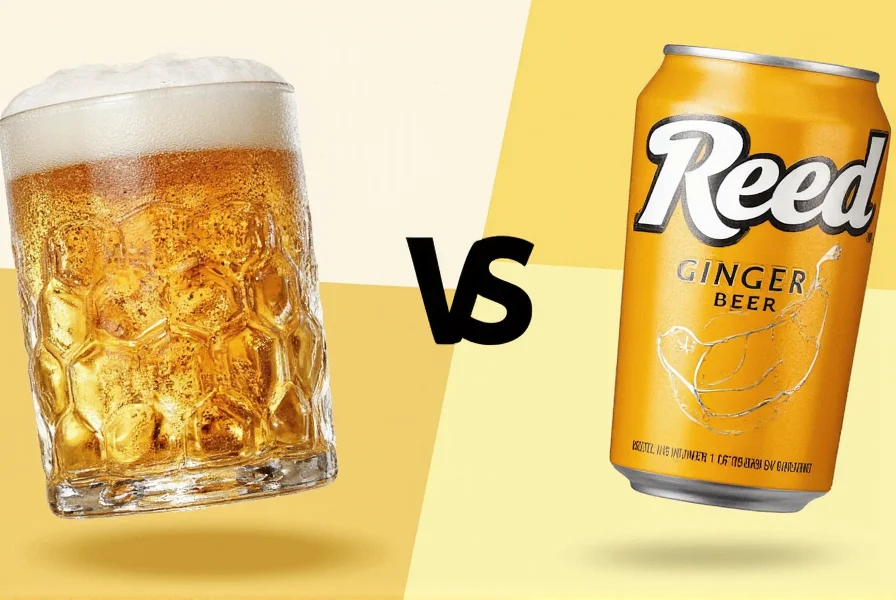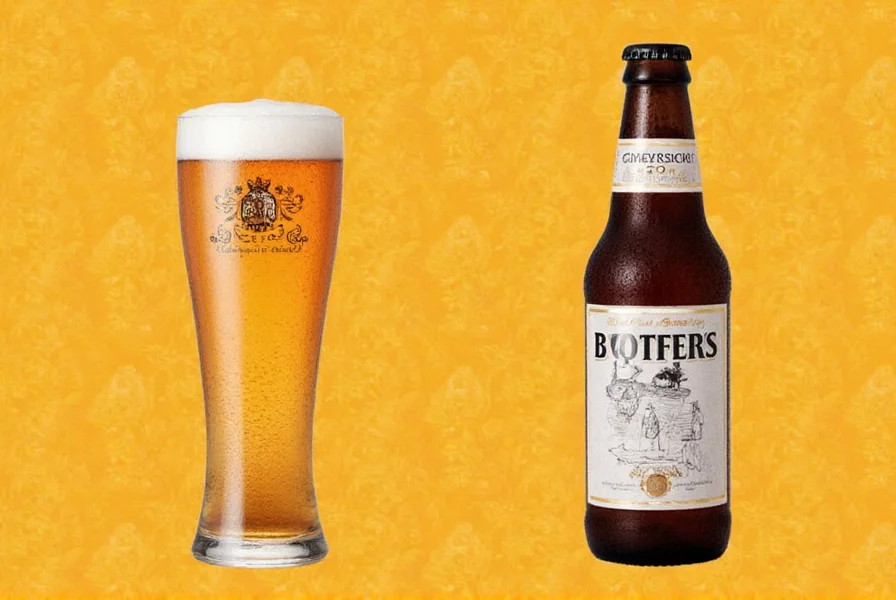"Reed ginger beer" is a common misspelling or misunderstanding of "real ginger beer." Authentic ginger beer refers to traditionally fermented beverages made with fresh ginger root, sugar, water, and a fermentation culture (like the ginger beer plant or "GBP"). Unlike commercial ginger ales, real ginger beer contains live probiotics from natural fermentation and has a more complex, spicy flavor profile with subtle carbonation.
When searching for "reed ginger beer," you're likely looking for information about authentic, traditionally made ginger beer. This confusion stems from the phonetic similarity between "reed" and "real" in spoken English. Understanding this distinction is crucial for anyone interested in the genuine article rather than mass-produced alternatives.
What Makes Ginger Beer "Real"?
True ginger beer differs significantly from what you'll find on most supermarket shelves. Commercial products labeled as "ginger beer" are typically carbonated soft drinks made with ginger flavoring, high fructose corn syrup, and artificial ingredients. Real ginger beer, however, undergoes natural fermentation using fresh ginger root.
The traditional brewing process involves:
- Freshly grated ginger root (not powder or extract)
- Natural sweeteners like cane sugar or honey
- A fermentation culture (historically the ginger beer plant)
- Water
- Optional flavorings like lemon, lime, or spices
| Characteristic | Real Ginger Beer | Commercial Ginger Beer |
|---|---|---|
| Production Method | Natural fermentation | Carbonated soft drink |
| Ginger Content | Fresh ginger root | Ginger flavoring or extract |
| Sugar Source | Natural sugars (consumed during fermentation) | Added sugars (high fructose corn syrup) |
| Alcohol Content | 0.5-2% naturally occurring | Non-alcoholic |
| Probiotics | Present (live cultures) | Absent |
A Brief History of Traditional Ginger Beer
Ginger beer originated in England during the mid-18th century as a fermented beverage made with ginger, sugar, water, and a symbiotic culture known as the "ginger beer plant" (GBP). This isn't actually a plant but a living culture of yeast and bacteria similar to kombucha SCOBY.
Before modern refrigeration and carbonation techniques, natural fermentation was the primary method for creating carbonated beverages. Traditional ginger beer was popular across the British Empire and evolved with regional variations. In many Caribbean countries, ginger beer became an important cultural beverage with unique preparation methods.

Health Benefits of Authentic Ginger Beer
While commercial ginger ales offer little beyond hydration and sugar, real fermented ginger beer provides several potential health benefits derived from its natural ingredients and fermentation process:
- Digestive support: Ginger contains gingerols that may help with nausea and digestion
- Probiotic content: Natural fermentation creates beneficial bacteria for gut health
- Antioxidants: Fresh ginger provides natural antioxidants
- Lower sugar content: Much of the sugar is consumed during fermentation
Research published in the Journal of Food Science and Technology confirms that traditionally fermented ginger beverages contain bioactive compounds with potential anti-inflammatory properties. However, these benefits apply specifically to naturally fermented versions made with fresh ginger, not commercial products with artificial ginger flavoring.
How to Identify Authentic Ginger Beer
With the craft beverage movement, more authentic ginger beer options are appearing in stores. Here's how to spot the real deal:
- Check the ingredients list for "fresh ginger" or "ginger root" rather than "ginger flavor"
- Look for references to "naturally fermented" or "live cultures"
- Products requiring refrigeration are more likely to be authentic
- Examine the sugar content - authentic versions typically have lower residual sugar
- Small-batch producers are more likely to use traditional methods
Many craft breweries and specialty beverage companies now produce genuine fermented ginger beer. These products often have a more complex flavor profile with noticeable spice from the ginger and subtle carbonation from natural fermentation.
Making Your Own Real Ginger Beer at Home
Creating authentic ginger beer at home is surprisingly straightforward. The traditional method requires minimal equipment and ingredients:
- Prepare a ginger bug (a simple fermentation starter made with fresh ginger, sugar, and water)
- Allow the ginger bug to develop for 3-5 days, feeding daily
- Create a strong ginger tea with fresh ginger, sugar, and water
- Cool the tea and combine with your active ginger bug
- Bottle in swing-top bottles for secondary fermentation
- Allow to ferment at room temperature for 2-5 days
- Refrigerate to slow fermentation before serving
Home brewing allows complete control over ingredients and fermentation time, resulting in a beverage tailored to your taste preferences. Many enthusiasts appreciate the slight natural carbonation and complex flavor that develops through proper fermentation.
Where to Find Authentic Ginger Beer
While commercial ginger ales dominate supermarket shelves, authentic ginger beer is becoming more accessible:
- Specialty health food stores often carry fermented versions
- Craft breweries increasingly produce ginger beer
- Local farmers' markets may feature small-batch producers
- Online retailers specializing in fermented beverages
- Some craft soda companies now offer traditionally fermented options
When searching for authentic ginger beer, look for brands that emphasize "naturally fermented," "raw," or "live cultures" on their labels. These products typically require refrigeration and have a shorter shelf life than commercial alternatives, but offer the genuine flavor and potential benefits of traditional ginger beer.
What's the difference between real ginger beer and commercial ginger beer?
Real ginger beer is naturally fermented using fresh ginger root, creating a beverage with live probiotics, subtle carbonation, and complex flavor. Commercial ginger beer is typically a carbonated soft drink made with ginger flavoring, high fructose corn syrup, and artificial ingredients without fermentation.
Does authentic ginger beer contain alcohol?
Traditionally fermented ginger beer contains a small amount of naturally occurring alcohol (typically 0.5-2%) as a byproduct of the fermentation process. The alcohol content depends on fermentation time and temperature. Commercial ginger beers are non-alcoholic.
How long does homemade ginger beer last?
Properly fermented and refrigerated homemade ginger beer typically remains fresh for 2-4 weeks. The live cultures continue working slowly even in the refrigerator, so pressure may build over time. Always open bottles carefully over a sink to avoid overflow.
Can I make ginger beer without sugar?
Sugar is essential for the fermentation process in traditional ginger beer, as it feeds the yeast and bacteria. While you can reduce the amount, eliminating sugar entirely would prevent proper fermentation. Much of the sugar is consumed during fermentation, resulting in lower residual sugar than commercial versions.
Is real ginger beer good for digestion?
Authentic fermented ginger beer may support digestion due to both the ginger content (which contains compounds that aid digestion) and the probiotics from natural fermentation. However, individual results vary, and it shouldn't be considered a medical treatment for digestive issues.
Final Thoughts on Authentic Ginger Beer
Understanding the distinction between "reed" and "real" ginger beer opens the door to appreciating a traditional beverage with rich history and potential health benefits. While commercial alternatives dominate the market, the craft beverage movement has revived interest in authentic, naturally fermented ginger beer.
Whether you choose to seek out artisanal producers or try your hand at home brewing, genuine ginger beer offers a more complex flavor profile and potential digestive benefits that mass-produced versions cannot match. The key is looking beyond marketing terms to find products made with fresh ginger through natural fermentation processes.











 浙公网安备
33010002000092号
浙公网安备
33010002000092号 浙B2-20120091-4
浙B2-20120091-4